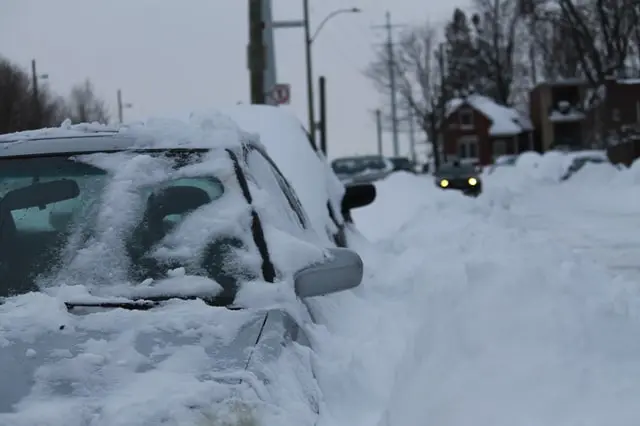The Winter season comes with joy and celebration, but it might not be so for car owners who are often in panic and wonder if they should move their car.
The truth is that snow can harm your car. However, depending on your location and the severity of the winter weather, you may be able to leave your vehicle in the snow without any problems.
So to clear the worry, you need to understand some common questions surrounding the topic. So this post will answer nine common questions about leaving cars in the snow. Keep reading.
Table of Contents
- Is it Bad to Leave a Car in the Snow?
- How Long Can a Car Sit in Winter?
- How long can you leave a car without starting in cold Weather?
- Does Snow Hurt Cars Paint?
- Can Your Gas Tank Freeze?
- Will My Car Rust in the Snow?
- How cold is too Cold for a Car?
- Should I Start my car Every day in Winter?
- How Long Should I Warm up my Car in Winter?
- Final words
Is it Bad to Leave a Car in the Snow?

While leaving your car parked in the snow may be tempting, it is essential to be aware of the potential risks involved. Some of the impending risks include:
- The car gets covered in ice
One of the most significant dangers of leaving a car in the snow is that it can become covered in ice. This can impede your ability to open the vehicle’s doors. If your vehicle has a sunroof, drains could get clogged when the snow melts off.
- Battery damage
If the car is left in the snow for extended periods, the cold weather can damage your car’s battery, making it more likely to fail when you need it most. It is best to avoid leaving your car in the snow for extended periods.
- Solidified fluids
The fluids in the hood start thickening in the winter. This means that the liquids don’t move freely, making starting the car difficult.
- Deflated tires
If you leave the car in the winter for too long, the tire pressure will decrease with time. Low tire pressure could cause a blowout, which can be extremely dangerous.
- Corrosion
The snow and ice can cause the metal on your car to corrode faster than usual because of the salt used to melt the ice. Over time, this corrosion can lead to significant damage to your car.
- Spark plug fail
Spark plug failure is one of the most common problems associated with leaving a car in the snow. The spark plugs ignite the air-fuel mixture in the cylinders, and when they fail, the engine will not start.
How Long Can a Car Sit in Winter?
Determining how long a car can sit in the winter depends on several factors. The first is the temperature. If it’s below freezing point, you should be careful about leaving your car for too long.
Also, consider the type of car you have. Some vehicles are better equipped to handle the cold than others.
Lastly, you must consider the purpose you intend to use your car for. If you are driving around town, you probably don’t need to worry too much about leaving your car in the cold. If you’re going on a long trip, you’ll want to ensure your car is up for the challenge.
How long can you leave a car without starting in cold Weather?
You should try starting your car at least once a week in cold weather, even if you don’t plan to drive it.
This will help keep the battery charged and prevent the engine from freezing. You could even start the car occasionally but not too often.
If you cannot start your car for an extended period, you can do a few things to prepare it.
You can disconnect the battery, add a battery tender, or even add an oil stabilizer to help keep the engine lubricated.
Does Snow Hurt Cars Paint?
Snow storms, extreme cold, and ice hurt your car’s paint. However, the snow and ice might not harm your paint job directly but attempting to remove them will.
The tools you use to scrape off snow or salt will affect the paint big time! So here are some tips to prevent paint damage:
- The tools in the market for scraping snow off the car windows are less ideal. Use tools with foam or rubber edges to scrape off snow from your car.
- Do not pour hot water onto the car to melt the ice. The glass might crack from the sudden change in temperature.
- Wash the car to prevent the corrosive effect of salt and water.
- Apply wax to the paint as a barrier between the car’s body and the snow.
- Cover the car with a cover designed for cold protection if it sits in the cold for some time.
- Apply a paint protection film.
- Patch over any scrapes or chips on the car’s body since they leave the parts of the car helpless to fight corrosion effects.
Can Your Gas Tank Freeze?
Yes, your gas tank can freeze in the winter. This is more likely to happen if you live in a colder climate with temperatures below -40degrees Fahrenheit.
Also, the gas tank might freeze if you haven’t added an anti-freeze additive to the gas. You can add isopropyl gas anti-freeze or regular isopropyl alcohol to prevent the gas from freezing.
If your gas tank does freeze, it can crystallize, and the crystals get pulled out by the fuel filter, which may lead to clogging. It is always important to thaw it out before trying to drive your car to prevent damage.
Will My Car Rust in the Snow?
Winter seasons mean salty roads that could cause your car to rust. To prevent rusting in the winter:
- Apply for rust protection
The car’s underbody is the most susceptible to salt and snow damage. Applying rust protection to your car’s underbody will significantly extend the car’s life. The new cars on the market have plastic covers, but if dirt gets stuck, they will rust.
- Apply wax
You can apply wax to the paint after washing the car to prevent rust from forming. Give attention to the chassis and near the wheels before the onset of winter.
- Use all-weather mats
You will bring snow on your shoes when getting in and out of the car. So to protect the interior of the car from rusting, get an all-weather mat. This will prevents water and dirt from getting to the floor.
- Oil
Using waste oil to prevent rusting is an effective method borrowed from the old farmers. This cheap product coats the metals well and absorbs the dirt and salt from the roads without reaching the metal.
- Wash the car
Salt is often used to clear snow off the roads. The salt is good for the road but bad for the cars. The salt sticks to the vehicle, increasing the chances of rusting and corrosion. To prevent that, you can wash it regularly.
- Clean drains
Ensure that the doors and fender drains are free from dirt and leaves. The dirt blocks these drains, promoting rust.
How cold is too Cold for a Car?
Cold weather below 32 degrees can cause severe damage to your car. The engine can have serious issues, but you can always start the car and let it run idle f you sense the temperatures dropping.

Should I Start my car Every day in Winter?
If you live in an area where it snows frequently and heavily, starting your car every day during the winter is a good idea.
This will help prevent your car from freezing up and becoming inoperable. If you live in an area that does not snow often, you can probably get away with starting your car once or twice a week.
Ensure also that you start the engine and allow it to idle for some time, so the lubricating oil gets to all the vital parts of the engine.
How Long Should I Warm up my Car in Winter?
You should warm up your car for at least a few minutes before driving in the cold weather.
This will give the engine time to warm up and prevent potential damage. It’s also a good idea to let your car idle for a while for the oil to circulate to all the parts.
Final words
Taking care of your car during winter is crucial to prevent any major issues. Ensure you start it regularly, clean it off after snowstorms, and don’t let it sit idle for too long in the cold. Following these tips can keep your car running smoothly through the winter season.



